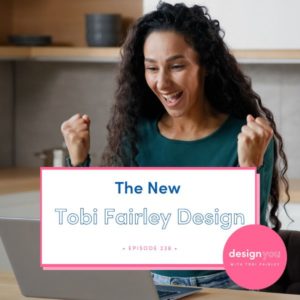
It has been a week, y’all! After 18 months of rebranding, photoshoots, and website design, I am so excited to share that our new site is now LIVE. We could not be more excited! It is so much more than just a new site – it is a representation of all the incredible things we’ve done over the last couple of years, and I cannot wait for you to see it.
For 18 months, we have had this website relaunch in the pipeline and this project has been a labor of love, so in honor of this big moment, I’m sharing more about the process with you this week. Because we don’t just have a new website, in many ways, we’re a completely new company!
Listen in this week and hear how we have reimagined the entire company over the last couple of years and some of the incredible things you can expect from the new website. Hear some of the changes we have made in our company, some of the amazing things we’ll be doing moving forward, and how you can be part of such an exciting time here at Tobi Fairley Inc.!





